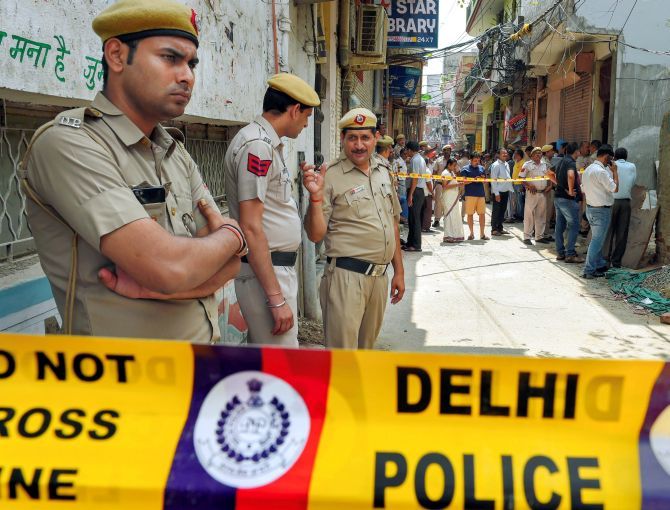'It isn't likely that he would have observed a 'strategic silence' on a sensitive and controversial issue, as is done today by the powers-that-be lest an observation lets the cat out of the bag about the ruling dispensation's mindset,' says Amulya Ganguli.

What would Jawaharlal Nehru have said about the mysterious deaths in Burari, a Delhi suburb, while expressing his views -- Mann ki Baat -- in his fortnightly letters to chief ministers?
For a start, it isn't likely that he would have observed a 'strategic silence' on a sensitive and controversial issue, as is done today by the powers-that-be lest an observation lets the cat out of the bag about the ruling dispensation's mindset.
Instead, Nehru would have charged right into the middle of the contentious subject in an attempt to clarify matters.
Nehru's response to the deaths in Burari, where a middle class family allegedly took their own lives for reasons which are supposedly related to their belief in the occult, would have been to stress the importance of cultivating a scientific temper, for that might have prevented the tragedy.
Perhaps he felt the need to emphasise science because India lives in two contrary worlds.
Nothing demonstrated this dichotomy more graphically than the fact that a satellite was once carried to the launching site in a bullock cart.
Even as the brilliance of Indian technologists makes it easy for them to secure highly coveted jobs in the US -- so much so that a protectionist president is clamping down on their influx -- witch-hunting is not unknown in the countryside recalling the dark medieval ages.
Two thousand 'witches' were killed between 2005 and 2015 in various parts of India.
There are also occasional reports of human sacrifices to propitiate the gods by gullible individuals on the advice of shamans who claim to have supernatural powers.
Apart from such gory examples of belief in the afterlife, there are more harmless dalliances in voodoo such as reliance on astrology and on the vaastu shastra relating to living quarters.
Politicians are particularly guilty of succumbing to the lure of black magic of this nature presumably because of the inherent uncertainties in their way of life.
It is not surprising, therefore, that in a country with so much faith in mumbo-jumbo, a minister can proclaim the efficacy of Vedic mantras to make crops grow or a judge can say that a pea hen is impregnated by the tears of the peacock.
Similarly, another minister who looks after science (!) has expressed his deep faith in the therapeutic properties of cow's urine and laboratories are currently engaged in endorsing his views since a contrary report will not be politically correct.
An extension of such bizarre convictions are the assertions that India had all the present-day amenities in ancient times such as aeroplanes and the Internet.
Such these weird claims were presented at the Indian science congress sessions, a Nobel Laureate, Venkatraman Ramakrishnan, has said that he would no longer attend such 'circuses' in future.
As it is, science in India is a neglected subject.
No Indian has received a Nobel Prize in science since Sir C V Raman in 1930 although three Indian scientists living abroad have won it -- Hargobind Khorana, Subramanyan Chandrashekhar, who was Raman's nephew, and Venkatraman Ramakrishnan.
As is obvious, rationality is related to science.
However, the killings of Narendra Dabholkar, who was president of the Andhasraddha Nirmoolan Samity dedicated to the elimination of blind faith, and of two other rationalists, Govind Pansare and M M Kalburgi, have shown this is no country for those who oppose obsolete dogmas and superstitions.
It is worth recalling that even Nehru noted that there is no evidence even in the present modern age of the scientific temper in the people or their leaders.
This regretful admission is truer today than ever before given the conduct and statements of present-day leaders.
Burari, therefore, was a tragedy waiting to happen.
Amulya Ganguli writes on current affairs.











 © 2025
© 2025